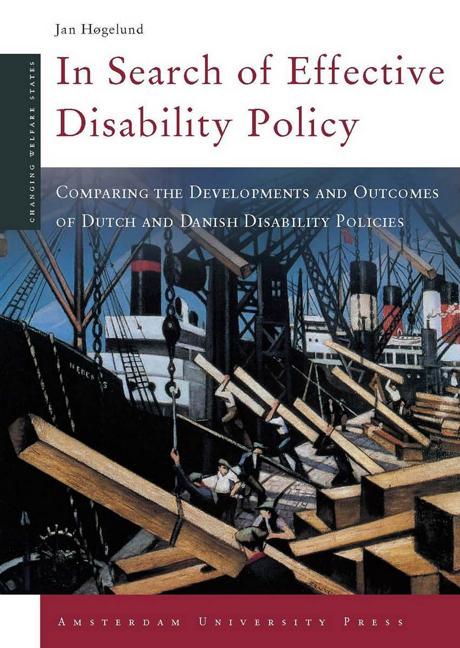 In Search of Effective Disability Policy
In Search of Effective Disability Policy Book contents
- Frontmatter
- Contents
- Acknowledgement
- 1 Disability Policies Under Pressure
- 2 The Integration of Disabled People:What Do We Know?
- 3 Bringing the Pieces Together:A Multidisciplinary Approach to Work Disability
- 4 Economic Miracles Bypassing Disabled People
- 5 Dutch Disability Reforms:Redefining Responsibilities
- 6 Danish Disability Policy:Small Steps,Big Change?
- 7 Different Routes to Integration
- 8 Different Policies – Different Outcomes
- 9 Too Much and Too Little:Employers’Responsibility in Denmark and the Netherlands
- Tables and Figures
- Notes
- References
- Index of Subjects
- Index of Names
2 - The Integration of Disabled People:What Do We Know?
Published online by Cambridge University Press: 15 January 2021
- Frontmatter
- Contents
- Acknowledgement
- 1 Disability Policies Under Pressure
- 2 The Integration of Disabled People:What Do We Know?
- 3 Bringing the Pieces Together:A Multidisciplinary Approach to Work Disability
- 4 Economic Miracles Bypassing Disabled People
- 5 Dutch Disability Reforms:Redefining Responsibilities
- 6 Danish Disability Policy:Small Steps,Big Change?
- 7 Different Routes to Integration
- 8 Different Policies – Different Outcomes
- 9 Too Much and Too Little:Employers’Responsibility in Denmark and the Netherlands
- Tables and Figures
- Notes
- References
- Index of Subjects
- Index of Names
Summary
In order to better understand how disability policies influence citizens’ attachment to the labour market, we need to identify the conditions and mechanisms that determine why some people with health problems remain in the labour force whereas others enter a disability programme. The purpose of this and the next chapter is, therefore, to put forward a theoretical framework that can guide an analysis of the consequences of Dutch and Danish disability policies. This chapter reviews some of the literature within the area of the labour market integration of sick-listed workers. Against the background of this review the following chapter presents a theoretical model of labour market integration.
Labour market reintegration of sick-listed workers has been the subject of research in several research disciplines. This review includes contributions from four major disciplines: 1) clinical studies; 2) economics; 3) public policy; and 4) sociological studies. Including research from several different disciplines makes it possible to propose a theoretical model for labour market integration based on a broad range of insights; as will be shown in the following sections, a multidisciplinary research strategy is necessary in order to illuminate the question of which factors affect the labour market integration of work-disabled people. One problem with this approach, however, is that the quantity of literature on work disability and labour market attachment is overwhelming. Therefore this review focuses mainly on studies with populations (workers sick-listed for more than 13 weeks) and outcome measures (return to work) that are close to those used in the analyses in this book.
Clinical studies
One important aspect of the clinical approach to research on work disability concerns the relationship between pathology, impairment, functional limitations and work disability. Activation of the body's defence and coping mechanisms may be caused by an injury or a disease. This ‘stage of active pathology’ will result in an impairment, that is, a physiological or anatomical loss or other abnormality, which in turn can lead to functional limitations (Nagi, 1965; Nagi, 1969; Waddell, 1987; Aarts and de Jong, 1992). Functional limitations can be classified at different levels, e.g. at the level of organs and systems or at the level of activities and tasks.
- Type
- Chapter
- Information
- In Search of Effective Disability PolicyComparing the Developments and Outcomes of the Dutch and Danish Disability Policies, pp. 31 - 52Publisher: Amsterdam University PressPrint publication year: 2003


